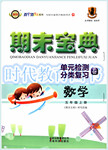��Ŀ����
�� Mum, I feel very thirsty. Can I drink some orange juice?
�� I��m afraid you can��t. There is _______ left in the fridge.
A. none B. nothing C. something D. anything
A �����������⣺�������裬�Ҿ��úܿʡ����ܺ�Щ��֭�� �������²��У�������һ��Ҳû�С�A. noneû��һ�㣬������ָ��orange juice��B. nothingû�ж���; û�����飬�Ǵ��ʣ�C. somethingij�ij�£�D. anything�κζ���; �����ڷ䡢���ʾ��У����ɾ���There is _______ left in the fridge.�Ľṹ��֪Ϊ�϶���ʽ...
��ϰ��ϵ�д�
 ��ĩ���䵥Ԫ�����ิϰ��ϵ�д�
��ĩ���䵥Ԫ�����ิϰ��ϵ�д�
�����Ŀ

